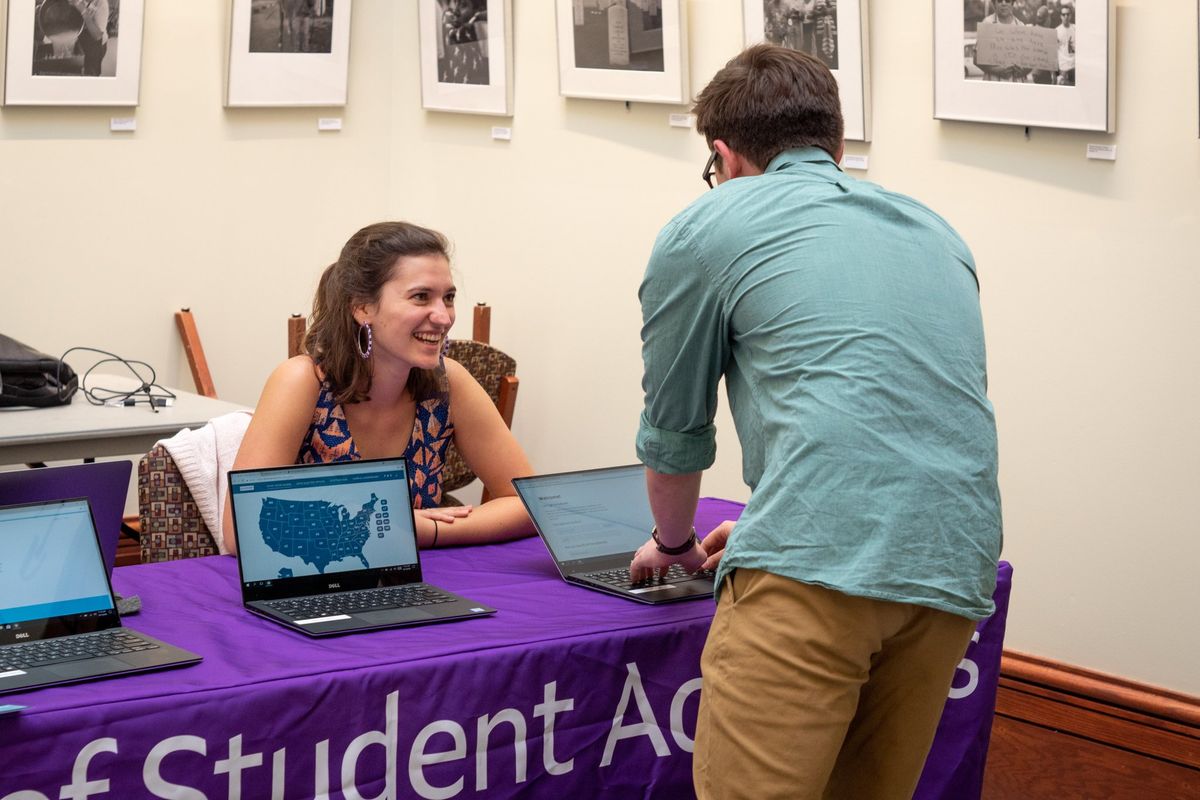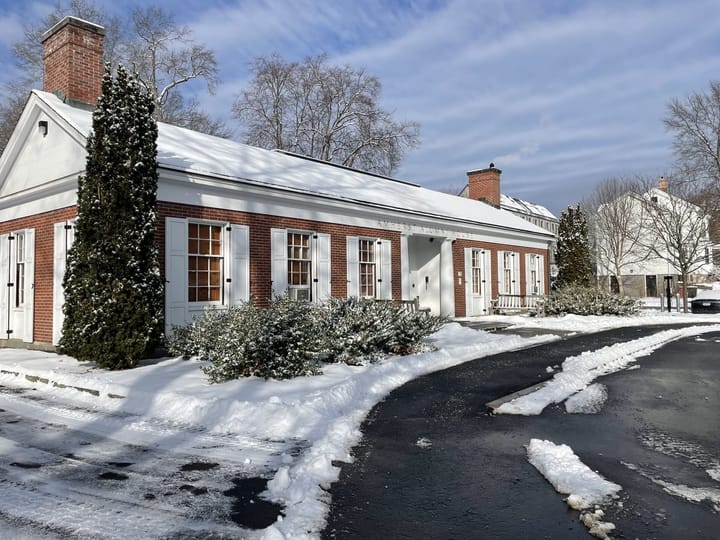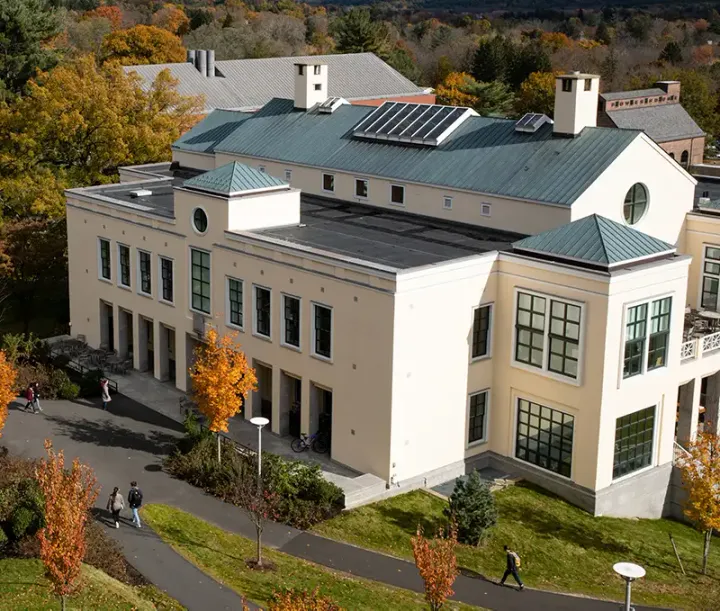Anxious Campus Awaits Consequential Election Day
Students and faculty expressed deep anxiety about the result of Tuesday’s contest. Many also spoke to a sense that the problems facing American democracy will persist, no matter who wins.

“How many of you believe that if Donald Trump is elected, American democracy will exist in five or 10 years?” asked Professor of Jurisprudence and Political Science Austin Sarat to a crowded family weekend audience.
Just a few people raised their hands.
The event last Saturday, titled “Is Democracy Doomed?” captured the mood as the campus awaits Tuesday’s presidential election, which many view as a referendum on the future — and very existence — of American democracy.
Ahead of Election Day, The Student spoke to students and faculty about the political atmosphere on campus, the role students have played in the campaign, and the potential long-term implications of the election.
In interviews, the theme of anxiety stood out above all others.
“There is a high level of anxiety on campus around the election, and there is also a high level of awareness of what’s at stake in the election,” said Professor of Law, Jurisprudence, and Social Thought Lawrence Douglas. “There are issues about the survival of constitutional democracy. For students, it’s on their radar.”
One issue contributing to anxiety is the Trump campaign’s anti-immigrant sentiment.
“All the anti-immigrant spirit during this political season is definitely very scary, [especially] if you’re in a predominantly white area and don’t know if you can feel safe,” said Daniela Rosario ’26, who comes from a family of immigrants. “[My mom] said, ‘This is very difficult because we don’t know the status of our rights anymore’ … it’s very much an anxious atmosphere in the household.”
Vivi Alvarado ’27 also comes from a family of immigrants.
“Just thinking about how deep anti-immigrant sentiment was in 2016 … I think that if Trump were to win, it would be that same sentiment expressed,” she said. “That’s scary because I have to think about the fact that I’m here and my [family] is in Texas. If anything were to happen, I don’t know how I would go about [helping them].”
For many, the anxiety extends beyond Election Day to more long-term concerns about the viability of democratic institutions.
“Whatever happens next Tuesday, the problems of American democracy will still be there for us to address,” Sarat said during the talk on Saturday.
He proceeded to display graphs that showed falling faith in democracy, especially among younger generations, and a general increase in political polarization.
Kevin Hoff ’27 suggested that young people’s pessimism was justified.
“When Jan. 6 happened, I felt like, there is absolutely no way that we are going to get to the next election and Trump is going to be the candidate, let alone he’s not going to be in jail for what he’s just done,” he said. “And here we are, and I feel a little defeated.”
Much of the college’s election week programming has sought to help students manage these anxieties.
Last week, Professor of Psychology Catherine Sanderson held a session called “Navigating Election Anxiety,” where she offered strategies for grappling with election fears and fostering wellness. On Monday afternoon, the Center for Restorative Practices led the first of a series of restorative circles titled “Sharing Anxiety about the U.S. Elections,” which will continue even after election day. On election night, the Office of Religious and Spiritual Life will hold an election vigil on Memorial Hill, and a representative from the Center for Counseling and Mental Health will set up shop in the Powerhouse until 10 p.m.
At the event last week, Sanderson spoke of the uncertainty inherent in the final few days of the campaign.
“Many people get into a sort of state of suspended motion because you can’t simultaneously prepare,” she said. “Maybe I’ll be celebrating, or maybe I’ll be crying.”
Despite the uncertainty, individual students and a number of campus organizations have been actively involved in the campaign all semester. Groups like Amherst College Democrats and the Reproductive Justice Alliance have organized letter-writing campaigns and headed to New Hampshire to canvass, trying to turn out voters for presidential and vice presidential candidates Kamala Harris and Tim Walz. For months, student representatives from AC Votes have been a fixture of the Val foyer, encouraging students to register to vote and helping them navigate the often difficult process of voting absentee in their home states.
This year, students revived AC Republicans while rebranding the club to AC Conservatives.
“There’s a lot of frustration with the Republican party right now,” said Ben Henry ’27, a Black, Christian conservative voter from Georgia. “[AC Conservatives] is trying to distance itself from being a pro-Trump club. It’s more about the basic principles of conservatism.”
Henry said he was not politically involved on campus until students revived the club, and does not often identify himself as a conservative in discussions on campus.
Though many students found ways to get involved in the election, community members expressed varying degrees of satisfaction with the energy on campus, with some pointing to the factors that make it hard for students to mobilize.
“I haven’t been as tapped in with the level of activism on campus so far purely because being in season, I’m playing football, I’m studying, I’m going to bed,” Henry said.
Hoff expressed concern about the future of democracy, and deep anxiety about the election's outcome, but nevertheless said he found it hard to commit himself to this campaign in the way he has to other races in the past.
“The combination of being busy and sort of feeling a little disconnected from the local environment at Amherst make it hard to do campaign work as a college student,” he said.
As Election Day approached, multiple community members agreed that no matter what happens on Tuesday, the real test will be what happens in the weeks and months that follow.
“Let’s see how the next few months unfold before blowing up and calling the end of our country,” said Tom Ye ’25, one of the college’s Interns for Democracy. “From what I can tell, our democracy is extremely resilient, even with the many recent tests to its functioning.”
Meanwhile, Professor of Humanities and Latin American and Latino Culture Ilan Stavans emphasized the election’s stakes for national unity.
“My impression is that the wholeness of the election is not fully appreciated [on campus] in that it’s reduced to who wins and who loses,” he said. “The large question will be: Can 335 million people learn to live together after Tuesday, or are divisions going to be exacerbated?”





Comments ()